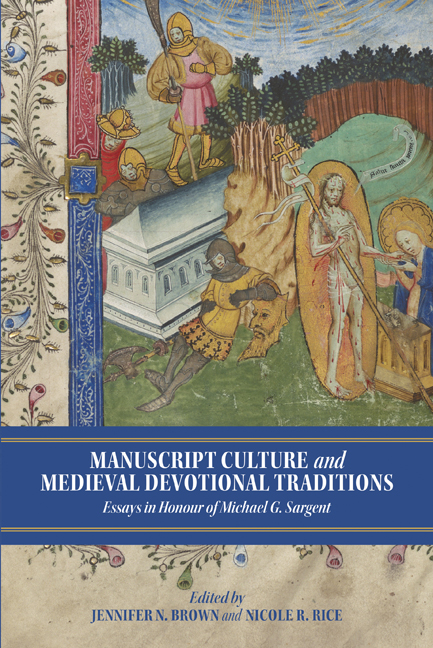Book contents
- Frontmatter
- Dedication
- Contntes
- List of Illustrations
- Acknowledgements
- List of Abbreviations
- Michael Sargent: An Appreciation
- I Manuscript Transmission and Textual Adaptation
- II Translated Texts and Devotional Implications
- III Rhetorical Strategies and Spiritual Transformations
- IV Texts and Contours of Religious Life
- Bibliography
- List of Contributors
- Michael G. Sargent’s Publications
- Index
- Tabula Gratulatoria
- York Manuscript and Early Print Studies
12 - Otherworldly Visions: Miracles and Prophecy among the English Carthusians, c. 1300–1535
Published online by Cambridge University Press: 24 March 2021
- Frontmatter
- Dedication
- Contntes
- List of Illustrations
- Acknowledgements
- List of Abbreviations
- Michael Sargent: An Appreciation
- I Manuscript Transmission and Textual Adaptation
- II Translated Texts and Devotional Implications
- III Rhetorical Strategies and Spiritual Transformations
- IV Texts and Contours of Religious Life
- Bibliography
- List of Contributors
- Michael G. Sargent’s Publications
- Index
- Tabula Gratulatoria
- York Manuscript and Early Print Studies
Summary
In his magisterial study, The Religious Orders of England, Dom David Knowles identified what he saw as a discomfiting contradiction at the heart of the Carthusian order in the later Middle Ages. On the one hand, he noted that the order continued to attract vocations of a very high quality, drawing many of their number from the universities and upper echelons of society; for this reason and also because of their legendary austerity, ‘they stood above the level to which satire or contempt could attain’. On the other hand, he identified ‘a love of the marvelous which sometimes extends beyond the bounds of good sense’, which reached its apex in the writings of Maurice Chauncy (d. 1581), the Carthusian monk and priest of London charterhouse who wrote four different versions of a work that narrated, with marked pathos, an eyewitness account of the tragic fate of his brethren who refused to take the Oath of Supremacy acknowledging Henry VIII as the supreme head of the Church of England. Chauncy's works are, indeed, full of stories of omens, portents, prodigies and supernatural happenings, and suggest that he shared a distinct taste for marvels and miracles more commonly ascribed to late medieval popular religious culture.
This essay aims to examine the broader history of otherworldly visions, miracles and prophecy among the English Carthusians during the pre-Reformation period, operating from an assumption that the orthodox monastic culture of the English Carthusians was manifestly ‘a culture of the miraculous’. This devotional culture of marvels and miracles, in my view, bore the distinct imprint of what Michael Sargent memorably called ‘the literary character of the Carthusian order’. From its inception in the eleventh century until its brutal suppression in England at the Henrician Reformation, the order produced numerous texts and images that imagined wondrous, energetic networks of communication between the dead and the living. Miracle and prophecy, moreover, often converged with the death-oriented piety of the Carthusians in unexpected ways – ways that are vitally linked to the history of the order in England.
The living and the dead
Miraculous commerce with the dead was, indeed, central to the Carthusian origin story, for a revenant had played a starring role in the foundation of the order.
- Type
- Chapter
- Information
- Manuscript Culture and Medieval Devotional TraditionsEssays in Honour of Michael G. Sargent, pp. 259 - 289Publisher: Boydell & BrewerPrint publication year: 2021



